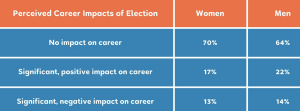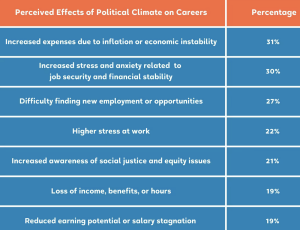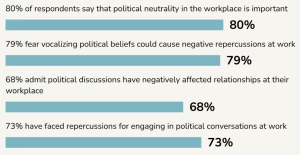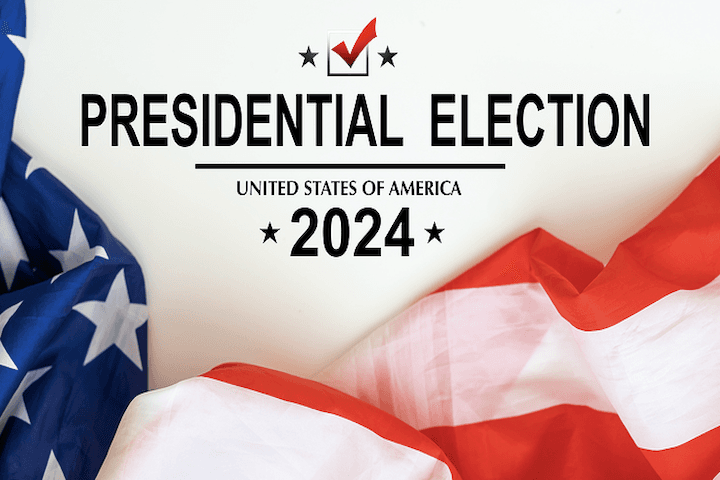
So, finally, it’s the morning after the night before.
This long (and possibly most divisive campaign to date), to anoint the 47th president of the United States of America is over.
The victor is declared, Trump is back, in a result that eventually took even the pollsters by surprise.
But, as many will ultimately realize, while the election itself might be over, the fall-out from it, and the new political landscape that will start to formulate is only just beginning.
And for employers – many of whom have found ways to valiantly keep a lid on political discussions at the workplace – this means the battle is yet to be over too.
According to Jordan Zaslav, COO at Axios HQ, the build-up to the election was only one half of the presidential campaign.
Divisive topics, political differences, discussions and disagreements around the build-up to the election have been one thing, but he says employers arguably need even greater vigilance, now that the post-election phase has begun.
With around 50% of the population likely to be unhappy with the result, he says leaders need to be alert to the very real post-election fall-out, and prepare themselves – during this current transitional phrase – for the inauguration of the new president in January.
He argues that while much of the discourse has been about avoiding political conflict at work ‘prior’ to the election, the aftermath is just as important – but is often overlooked by leaders.
To find out more about what he means, TLNT decided to have a deeper discussion with him:
Q: We know that prior to the election, it was a tense time, but with the result now in the bag, why do employers need to worry about the immediate post-election period?
A: “While the pre-election period is definitely the loudest, and when most division occurs, the immediate period ‘after’ the election is when employees will obviously start to feel more impacted by the result. There’s clearly lots of talk prior to the election, and now, leaders may have a tendency to think ‘the result is in, and so we can all move on.’ But the reality is that large cohorts of staff will now be feeling really unhappy about the result, and feeling upset and distressed. When this comes into the workplace, this sentiment almost becomes a silent tax, sapping productivity and engagement levels.”
Q: Do leaders ‘understand this feeling of ennui?
A: “I think that often they do not. But, the fact is that after big elections, people really do feel exposed. Prior to the election, political debate is all rhetoric, and discussions about what could ‘be’. Post-election, these promises turn into reality, and the debate moves to the what ‘is’ or ‘will be’. It has real impact, and impacts a person’s ideologies.”
Q: What can employers actually do about this though – can’t they simply say, this is the result, now let’s focus on what we need to do?
A: “I don’t think it’s about organizations needing to plan specific policies around this, but at the same time, they do need to have an appreciation for people’s feeling of loss on one side, and of jubilation on the other. Organizations need to prepare themselves against the political flavor of their staff.”
Q: Does having a holding period between now and the inauguration help?
A: “Yes and no. Sometimes there’s something cathartic about just turning over a new page quickly. The three-month gap could be a prolonging of this numb period for some, and be delaying the gratification for others. What the three-month period does grant employers though, is a period of time where they can craft their conversations, and hear from staff about how they are feeling.”
Q: “For companies who have tried outright bans on political discussion at work, won’t the result also release a load of pent-up pressure too?
A: “Quite possibly. I think the magnitude of an employers’ reaction to the election speaks volumes about the extent to which political discourse is accepted, tolerated, or encouraged. Coinbase famously has a policy of not allowing conversations of politics at work, but the reality is that staff will still be upset by the result, so there’s trouble being stored up here I think. I believe the post election period is a particularly difficult needle to thread, because it necessarily involves some form of civility and respect from anyone towards each other. It really shouldn’t be the case that people form judgements on colleagues just because the result did or didn’t go the right way for them. What CHROs definitely need to do though, is decide the path they want to follow – whether to be open about the changed political landscape, and encourage respectful debate about it, or whether it is not part of the company culture to discuss this.”
Q: Do you think this year’s post-election period will be tougher to manage because it was such a highly-charged campaign to begin with?
A: “My honest view, is that I think this element of the campaign has been a bit over-blown. Elections are always highly-charged, and I’m not sure if this year’s election has been any more unique in that respect. However, this year many more company bosses have been more vocal about what their political stripes are, and so in this context, it’s now time for companies to decide what their political ‘voice’ is. Where leaders have been particularly vocal on one side or another, they now have to decide what their cultural tenets are – so I say set clear expectations and be clear about beliefs to staff. Some staff may not like this though – but that’s the reality of ‘picking a side’. It’s a rocky road ahead. Now is the time to really focus on what this means.”

Axios has produced a guide which includes advice for CHROs on how companies can prepare their HR communications after the election is over.
You can access this guide by clicking here
Why the post-election period matters: what the data says:
Research by Flexjobs finds:


- 32% of workers said the November election will have a “significant impact” on their career
- 22% blame the current political climate for leading to higher stress at work
- 60% said a company’s political stance is a factor in their decision to work there
- 29% would “absolutely not” work for a company whose policies or practices misaligned with their values
According to research from Enhancv:
- 33% of Generation Z employees have lied about their political beliefs to avoid conflict while discussing politics at work
- 31% of workers experience conflict at work due to their political Men are more likely to experience conflict than women (35% vs. 26%)
- 5% overall have been disciplined at work for expressing political opinions
- Gen Z is 10 times more likely to have been disciplined than baby boomers (15% 1.5%)
- 1 in 5 overall feel threatened discussing politics at work
- Gen Z is almost twice as likely to feel threatened as baby boomers (28% 15%)
MyPerfectResume’s Political Discussions in the Workplace survey finds:


- 71% of workers wish political chatter at work would stop
- 79% fear that expressing political beliefs outside of work could lead to negative repercussions from their employer
- 68% say political discussions have negatively affected workplace relationships
- 89% believe employers should limit or discourage political discussions
- 74% would leave a job if their workplace promoted political ideologies they disagreed with
- Workers aged 25 or younger are particularly affected, with 92% indicating they would leave a job due to opposing political ideologies, compared to 72% of those 26 or older
